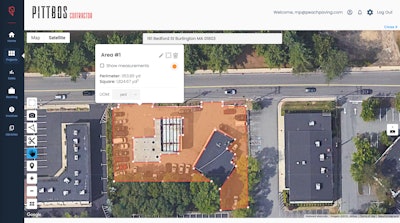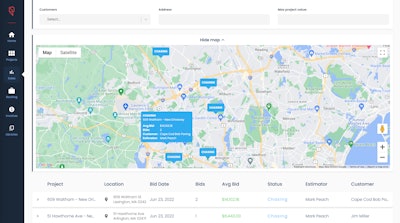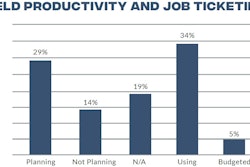
Asphalt pavement contractors can be small mom-and-pop shops or multi-location enterprises. While the larger contractors may have resources to stitch together multiple construction software products to address the unique way value flows through the business, smaller players may struggle.
Paving is a difficult process to address because many construction management software tools focus on projects with multiple subcontractors, phases and dependencies, while asphalt paving is more of a process. That process may include origination of the project from estimating, material ticketing, job ticketing, capturing production and securing revenue at close-out.
Things may be getting easier as entrepreneurial software companies with deep roots in the business launch software products optimized for both large and small contractors. These products may be strong in a specific part of the pavement workflow, but can encompass the entire quote-to-cash value stream, becoming almost like an enterprise resource planning (ERP) for the paving sector.
PavementSoft
As of our last briefing, one of these solutions is bringing customers on in smaller numbers through a waiting list system. PavementSoft is a paving industry-specific ERP application from a company that actually shares ownership and personnel with a national paving contractor—Manassas, Va.-based Brothers Paving and Concrete. Shawn Boyce serves as secretary of PavementSoft and chief revenue officer for Brothers.
“We have designed and built out PavementSoft really to meet our own needs,” Boyce said. “That is what we use to run our field, for our crews and sales--everything runs through PavementSoft.”
PavementSoft can be considered ERP because it gives contractors a single, digital workflow for the full value lifecycle from lead to bid to project and crew management to invoicing—from quote to cash. The supports more accurate estimating by exposing actuals. It also delivers control and the ability to modify invoices before they go out. There are integrations with both Quickbooks Desktop and Quickbooks Online. An integration with Netsuite is coming, according to Boyce.
Pittbos for Takeoff to Invoice
We first debriefed Pittbos CEO Mark Peach in April of 2023. Peach has been ramping up the company since 2020 after long experience in heavy construction materials. At that time, Pittbos was delivering a broad spectrum of functionality to 100 customers, including contractors and materials suppliers. By our second call in July 0f 2023, the customer count had increased to 150 with only two churning off the software.
Pittbos Contractor will handle the takeoff-to-quote-to cash processes of pavers while Pittbos Supplier streamlines plant management and the revenue lifecycle for materials businesses. The company early on took a high-touch approach to customer success, which was important as they built the two products around the needs of and incorporating feedback from the market.
“Our product is getting pretty mature on the contractor side, but our followup and feedback are praised by customers,” Peach said.
The focus on both contractors and materials suppliers delivers strategic advantages in growing the customer footprint—something that should make cagey paving executives more confident in the startup.
“We are working on some strategic partnerships with well-established players in the construction software industry,” Peach said. “With my network, asphalt manufacturing companies have been referring us to contractors. And now we have our first materials provider on the supplier product.”
“This materials provider called me and said it was refreshing to sit with us because you are not trying to offload the software to us,” Peach said. “You have done what we do, and have experienced our pain points.”
Asphalt Contractor Business Software
Contractors on Pittbos get a single system to contain:
- Take-offs
- Estimate worksheets and library
- Proposal generation
- CRM tools to Text & Email Customers
- Sales Reporting
- Document Management
- Backlog Management
- Invoicing
“The software tracks the leads—as the phone rings, it creates a project, knows status of the lead and whether an estimate and proposal are started, not started and sent,” Peach said. “We also give customers the ability to write notes internally. They can do takeoffs and use our document storage where each project gets its own folder of documents and pictures. The software creates proposals by using a library of actual costs, labor, equipment, crew cost, mobilization costs and materials costs. All goes into templated bid items. This means our customers can build bit items once and fly through estimates very accurately, boiling each into a proposal they can send digitally.”
Tracking communications and statuses around proposals can be handled in Pittbos, and customers can rely on the software as a customer relationship management system with scheduled follow-ups and notes on each discussion.
 Using Pittbos, an asphalt contractor can track projects they are pursuing.Pittbos
Using Pittbos, an asphalt contractor can track projects they are pursuing.Pittbos
Pittbos Software for Materials Suppliers
Peach said his goal is to digitize both sides of the asphalt equation, materials providers from the plant to the materials ticket and contractors from the estimate to the invoice.
“We can serve anybody that owns an asphalt plant,” Peach said.
Asphalt contractors were the first priority for Pittbos, but with the contractor functionality finding product-market fit, the team is now focusing more on materials providers.
“The software captures the constituent parts of the plants and builds out each plant’s location and materials lists consumed including liquid asphalt, crushed aggregate—plus fixed costs, utilization, labor, equipment and maintenance cost,” Peach said. “For each individual plant, we create the mixes you sell at that plant so we can get an accurate mix cost based on all the factors at that plant.”
The software can then set retail prices for each mix and to deliver freight onboard (FOB) sales quotes, even making available a portal where customers can access their quotes and pricing.
“Customers can request future project pricing from their portal,” Peach said. “We have integrations for their ticketing software in Pittbos so as the orders are fulfilled, the tickets get pushed into Pittbos and into their accounting software for accounts payable. At the plant when these orders are fulfilled, we push those accounts receivable events into their accounting software.”
Pittbos Tech Stack
Pittbos is a multi-tenant software-as-a-service (SaaS) product provisioned on Amazon Web Services (WAS). It is one of a few emerging construction software products built on Go, a programming language from Google. While Pittbos goes from quote to cash, an application programming interface (API) enables integration with financial software where the general ledger and overall company financials live. There is a standard integration with Quickbooks Online. Pittbos also offers an integrated a customer service portal and integration with Stripe to accept payments.
“If a client wanted us to push into another software product, we certainly could do that,” Peach said. “We have cost codes and individual customer ID numbers that can index against another system.”
Bootstrapped startups like Pittbos and Pavesmart may address core functionality first, and Pittbos has done an admirable job of addressing core needs and building a customer base. Because these companies can only get so far out in front of revenue with research and development, things like mobile apps can come out later. PavementSoft lacks one, and by the time of our second call with Pittbos in July of 2023, they were making investments that will extend the product onto native apps for Android and iOS.
“We just hired a head of product engineering, and this had been a big goal—to get a quality engineer to look after the whole tech side,” Peach said from the cab of his truck as he onboarded a large multi-location pavement company. “We had been using offshore coders and a product manager in the states. Our new hire has had his own startup, sold that, was available and his involvement is already paying huge dividends. I have an eye for designing product but don’t know the technical side at all.”
While web interfaces from PavementSoft and Pittbos may be responsive enough to work on a smaller screen size, native apps will provide a more performant experience with greater usability.
“We want to create a native app so you can download it and use the software in locations where you might not have internet access,” Peach said. “When it synchs back up to the internet, it can be represented in the database. This means that even if you are in the middle of Maine, you can still get an estimate out.”
Paving Software Pricing and Market
Pittbos charges $200 per month per user for a full license to complete any processes or transactions in the system. Limited users, for those in clerical or operations roles, are $50 per month. Pricing gets to be negotiable as the number of full users increases, likely kicking in around 10 or 12 full users.
Products like Pittbos and Pavementsoft can go substantially down market, but currently PavementSoft was still picking and choosing customers from a waiting list.
According to Peach, Pittbos will be a fit for contractors with as little as $3 million in annual revenue, with $50 million being the sweet spot where contractors can maximize value.
“We look at our competition as being pen and paper,” Peach said. “Above that $50 million line, you see big heavy highway contractors bidding airports and infrastructure. Other players like B2W and HCSS are well established for that work for these contractors, and it is hard to displace them. We are trying to provide software for people who don’t have it. We do this by distilling it down to an easier platform to use. As you look at the smallest contractors, guys are going to homeowners, getting a check and getting a quote in their mailbox. Those owner-operators have been doing it a long time, and it is very hard for them to change.”
There will be an internal cost for adopting any of these technologies, and contractors in particular may want to time their purchase to ensure they have capacity to assault a shallow learning curve. Contractors in regions where seasonality should look at adoption between September and May, depending on their climate and typical workload. This will enable them to build up there bid item libraries in a product like Pittbos so they are not focused on that when the rush hits.
A Future for Paving Software
Peach said the company will grow its footprint among asphalt paving contractors and materials suppliers, and then branch out to aligned industries.
“Right now, our total attainable market is 100,000 asphalt-related contractors and 4,000 asphalt plants,” Peach said. “We think we can spin this off into concrete finishers, any hardscape type contractors, utility contractors and site others.”
But there is more innovation coming, even for asphalt contractors.
“Our next steps on the product will be building a calendar view schedule, so our customers can put projects into the calendar and from that can order materials and drag and drop them around calendar. When an invoice is created for that day’s production, we will also provide tools to make it create a comparison to the estimate itself. Over time, we would like to incorporate more job costing systems. People have asked for trucking integration. As time goes on, we will have more and more of those API integrations.”



















